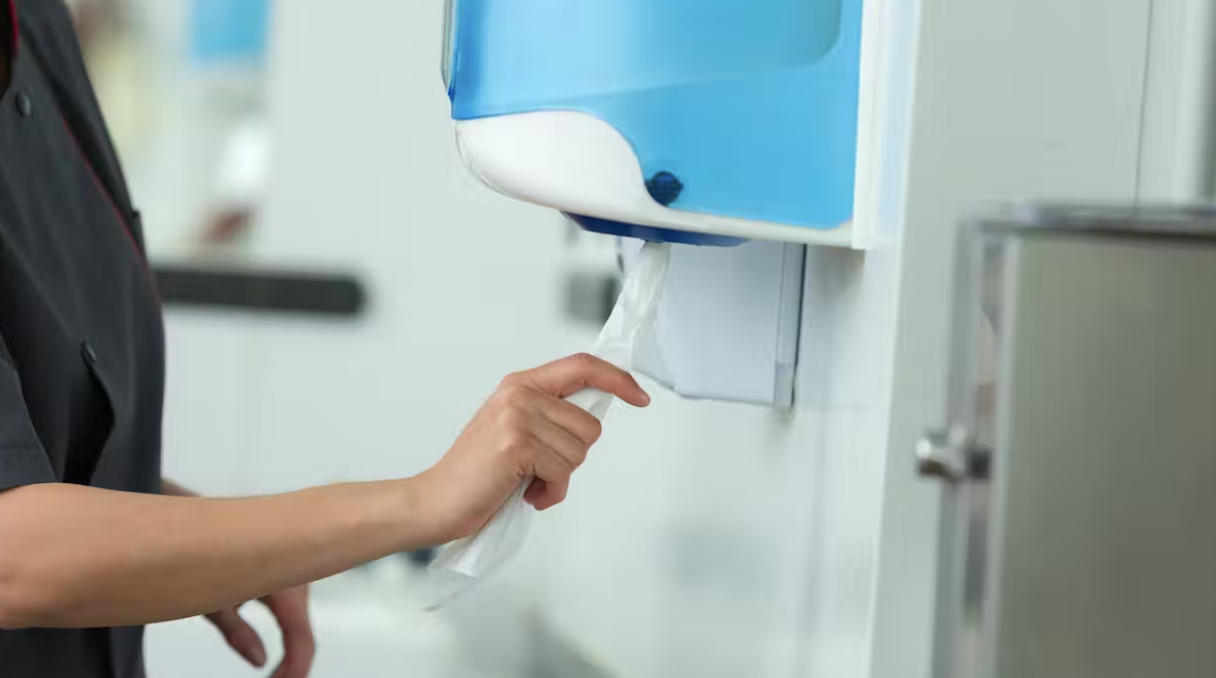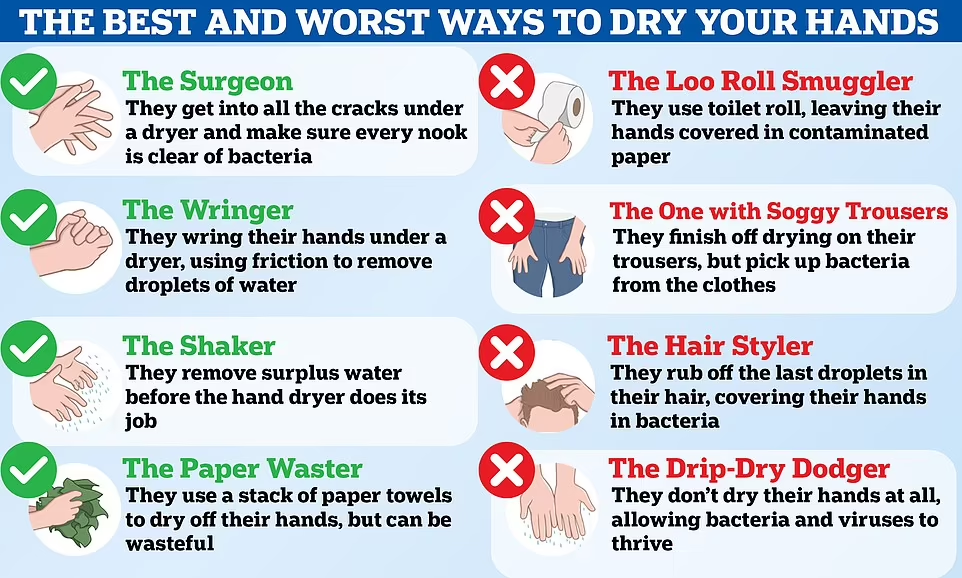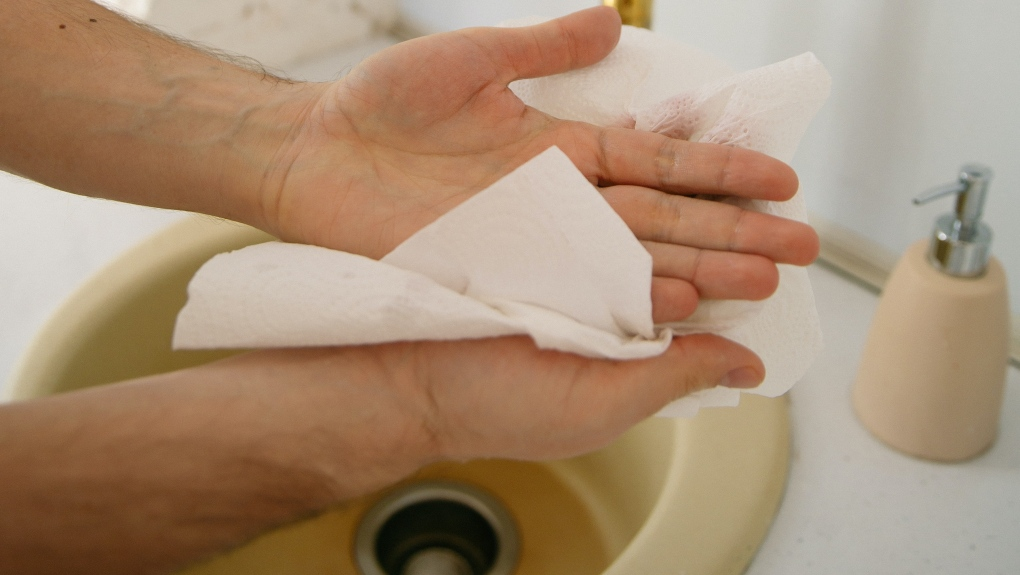Not drying your hands? Here's why you're risking more than just a cold!
- Replies 7
Whether we like it or not, our hands are dirty.
As they go from food to food and surface to surface, they pick up thousands of germs, bacteria, viruses, and other nasty things that can make us sick if they get into our bodies.
That's why it's so important that we all understand why hand hygiene is so necessary. If we want to avoid a public health disaster, the simplest solution is to wash them regularly!
But we're pretty sure everyone here at the SDC knows this already – we're a bunch of cleaning enthusiasts, after all!
However, it's likely that you haven't thought much about how to dry them. At least, properly.
Here, one expert claims that the only thing worse than not washing your hands is not drying them after you're done!

After washing your hands, drying them correctly helps to get rid of a lot of bacteria. Credit: ALPA PROD/Shutterstock. (Stock photo)
Experts say that E. coli and other germs thrive on moist surfaces, which includes our hands. Research has shown that 85 per cent of microbes are spread by people when they contaminate surfaces while their hands are still wet.
Because of this, Dr David Webber, a microbiologist with 50 years of expertise under his belt, has made it his mission to educate the public on the effectiveness of various hand-drying techniques in reducing the spread of disease-causing bacteria.
'The pandemic has focused attention on the correct way to wash our hands with published guidance from the WHO, CDC, and NHS. However, there has been no such guidance on the correct procedures to dry hands which are equally important,' he said.
'Not drying hands properly could be less hygienic than not washing them at all.'

These are the best and the worst ways to dry your hands, according to Dr Webber. Credit: Daily Mail.
Dr Webber has ranked eight of the world's most popular hand drying methods from best to worst, and coming out on top is 'the surgeon'.
He says that running your fingers through every part of your hands while using a hand dryer will help make sure they are completely dry and free of bacteria.
The expert says that the next best approach to dry your hands, after 'the surgeon' method, is to wring them under a hand dryer, using the additional friction to help remove droplets of water.
If you don't have access to a hand dryer, you can get the same results by shaking your hands. However, this can cause droplets to scatter all around the bathroom, spreading bacteria; therefore, it's important to always flick into a sink.
Using paper towels is the fourth best way to dry your hands, but Dr Webber warned that this can be wasteful and bad for the environment.

If you don't have a hand dryer at home, using eco-friendly paper towels is the best way to go. Credit: Pexels. (Stock photo)
And now, we'll talk about the not-so-good ways to dry your hands.
The use of toilet paper instead of paper towels was regarded as unsanitary since it can leave infected paper fragments on the hands.
In the same way, wiping off the last bit of moisture on your pants or skirt after they are dry can pick up any bacteria on your clothes, which defeats the purpose of washing your hands.
Some people also use a little bit of water left on their hands to style their hair. This is a big no-no in Dr Webber's book! When you do this, there's a chance that you'll take some of their scalp's germs with you, like the acne-causing bacteria.
The worst method is the drip-dry dodger or those who don't even bother to dry their hands at all – this lets viruses and bacteria spread to all surfaces touched by their wet hands.
Credit: Johns Hopkins Medicine.
Now that you understand how important it is to properly dry your hands after washing them, here are some guidelines on how to wash your hands correctly.
We hope this information will be helpful to you, members! Our hands can spread a lot of illness-causing bacteria, so by simply washing and drying them correctly, we can defend ourselves and our loved ones!
What are your thoughts? And among the hand-drying methods mentioned above, which one do you do? Let us know in the comments!
As they go from food to food and surface to surface, they pick up thousands of germs, bacteria, viruses, and other nasty things that can make us sick if they get into our bodies.
That's why it's so important that we all understand why hand hygiene is so necessary. If we want to avoid a public health disaster, the simplest solution is to wash them regularly!
But we're pretty sure everyone here at the SDC knows this already – we're a bunch of cleaning enthusiasts, after all!
However, it's likely that you haven't thought much about how to dry them. At least, properly.
Here, one expert claims that the only thing worse than not washing your hands is not drying them after you're done!
After washing your hands, drying them correctly helps to get rid of a lot of bacteria. Credit: ALPA PROD/Shutterstock. (Stock photo)
Experts say that E. coli and other germs thrive on moist surfaces, which includes our hands. Research has shown that 85 per cent of microbes are spread by people when they contaminate surfaces while their hands are still wet.
Because of this, Dr David Webber, a microbiologist with 50 years of expertise under his belt, has made it his mission to educate the public on the effectiveness of various hand-drying techniques in reducing the spread of disease-causing bacteria.
'The pandemic has focused attention on the correct way to wash our hands with published guidance from the WHO, CDC, and NHS. However, there has been no such guidance on the correct procedures to dry hands which are equally important,' he said.
'Not drying hands properly could be less hygienic than not washing them at all.'
These are the best and the worst ways to dry your hands, according to Dr Webber. Credit: Daily Mail.
Dr Webber has ranked eight of the world's most popular hand drying methods from best to worst, and coming out on top is 'the surgeon'.
He says that running your fingers through every part of your hands while using a hand dryer will help make sure they are completely dry and free of bacteria.
The expert says that the next best approach to dry your hands, after 'the surgeon' method, is to wring them under a hand dryer, using the additional friction to help remove droplets of water.
If you don't have access to a hand dryer, you can get the same results by shaking your hands. However, this can cause droplets to scatter all around the bathroom, spreading bacteria; therefore, it's important to always flick into a sink.
Using paper towels is the fourth best way to dry your hands, but Dr Webber warned that this can be wasteful and bad for the environment.
If you don't have a hand dryer at home, using eco-friendly paper towels is the best way to go. Credit: Pexels. (Stock photo)
And now, we'll talk about the not-so-good ways to dry your hands.
The use of toilet paper instead of paper towels was regarded as unsanitary since it can leave infected paper fragments on the hands.
In the same way, wiping off the last bit of moisture on your pants or skirt after they are dry can pick up any bacteria on your clothes, which defeats the purpose of washing your hands.
Some people also use a little bit of water left on their hands to style their hair. This is a big no-no in Dr Webber's book! When you do this, there's a chance that you'll take some of their scalp's germs with you, like the acne-causing bacteria.
The worst method is the drip-dry dodger or those who don't even bother to dry their hands at all – this lets viruses and bacteria spread to all surfaces touched by their wet hands.
Credit: Johns Hopkins Medicine.
Now that you understand how important it is to properly dry your hands after washing them, here are some guidelines on how to wash your hands correctly.
- Wet your hands with water.
- Apply enough soap to cover your hands.
- Rub your hands together.
- Use one hand to rub the back of the other hand and clean in between the fingers. Do the same with the other hand.
- Rub your hands together and clean in between your fingers.
- Rub the back of your fingers against your palms.
- Rub your thumb using your other hand. Do the same with the other thumb.
- Rub the tips of your fingers on the palm of your other hand. Do the same with the other hand.
- Rinse your hands with water.
- Dry your hands completely with a disposable towel.
- Use the disposable towel to turn off the tap.
We hope this information will be helpful to you, members! Our hands can spread a lot of illness-causing bacteria, so by simply washing and drying them correctly, we can defend ourselves and our loved ones!
What are your thoughts? And among the hand-drying methods mentioned above, which one do you do? Let us know in the comments!








